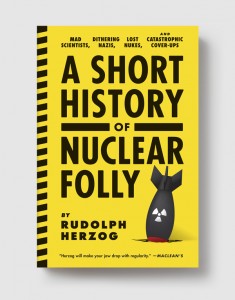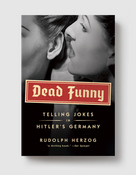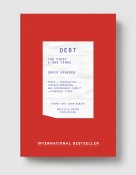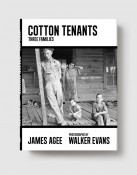
List price: $26.00
- Pages304
- ISBN9781612191737
- Publication dateApril, 2013
- Categories
- Booksellers
- Media
- Academics & Librarians
A Short History of Nuclear Folly
MAD SCIENTISTS, DITHERING NAZIS, LOST NUKES, AND CATASTROPHIC COVER-UPS
Rudolph Herzog
Translated by Jefferson Chase
“Herzog will make your jaw drop with regularity.” —Maclean’s
In the spirit of Dr. Strangelove and The Atomic Café, a blackly sardonic people’s history of atomic blunders and near-misses revealing the hushed-up and forgotten episodes in which the great powers gambled with catastrophe
Did you know?
• Edward Teller, the “father of the H-Bomb,” relentlessly promoted a plan to use 300 nukes to build a second Panama Canal.
• Atomic technology ended up in many places where it didn’t belong: Reactors were used to power satellites, some of which crash-landed and triggered nuclear emergencies. A plutonium battery was also installed at the top of the Himalayas . . . and lost.
• There’s a derelict research reactor in the middle of Kinshasa, Congo, which was built by an eccentric Belgian missionary. The reactor is falling apart, and several uranium fuel rods have been stolen.
• John Wayne died of cancer, as did 46 members of the crew of The Conqueror, a notoriously bad B-movie shot in a contaminated canyon near the Nevada nuclear testing range.
• About 40 nuclear weapons were lost during the Cold War, some in populated areas in the U.S. Some almost triggered, others were never retrieved.
• Nazi scientist Gernot Zippe was captured by the Soviets and forced to build the uranium centrifuge, which was used by Iran, Pakistan and North Korea to build bombs.
“For a book about such a heavy subject, A Short History of Nuclear Folly, keeps it quick and snappy and, dare I say, entertaining.” —Michael Buozis, Philadelphia Review of Books
“What Herzog has put together is something much harder to find these days: an intelligent case for plain, old common sense.” —Justin Rohrlich for NK News
“An eclectic, innovative approach to the bureaucratization of creativity during the Cold War.” —The Los Angeles Review of Books
“Unflinching… Let’s just say that Herzog’s use of the word ’folly’ is an understatement.” —The Village Voice, Spring 2013 Arts Guide
“It is arguably not possible to imagine human stupidity on a grander scale than what Rudolph Herzog has stockpiled in his new book.” —The Brooklyn Rail
“Meticulously researched and thrillingly told—reading this is as informative as it is spine-chillingly entertaining.” — Die Zeit
Praise for Dead Funny:
“Strikingly original historical research sets it apart.” —Time Out New York
“Subtle but scathing.” —The New Republic
“A concise, compelling book” —The Independent (UK)
“Herzog, the son of the film-maker Werner Herzog, shares his father’s curious and mordant wit.” —The Financial Times


